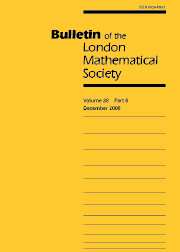Crossref Citations
This article has been cited by the following publications. This list is generated based on data provided by
Crossref.
Kohnen, Winfried
and
Sengupta, Jyoti
2006.
On the first sign change of Hecke eigenvalues of newforms.
Mathematische Zeitschrift,
Vol. 254,
Issue. 1,
p.
173.
Choi, D.
and
Choie, Y.
2007.
Linear relations among the Fourier coefficients of modular forms on groups Γ0(N) of genus zero and their applications.
Journal of Mathematical Analysis and Applications,
Vol. 326,
Issue. 1,
p.
655.
EL-GUINDY, AHMAD
2007.
LINEAR CONGRUENCES AND RELATIONS ON SPACES OF CUSP FORMS.
International Journal of Number Theory,
Vol. 03,
Issue. 04,
p.
529.
Choi, D.
and
Choie, Y.
2007.
Weight-dependent congruence properties of modular forms.
Journal of Number Theory,
Vol. 122,
Issue. 2,
p.
301.
Lachterman, Samuel
Schayer, Rhiannon
and
Younger, Brendan
2008.
A new proof of the Ramanujan congruences for the partition function.
The Ramanujan Journal,
Vol. 15,
Issue. 2,
p.
197.
KAZALICKI, MATIJA
2008.
LINEAR RELATIONS FOR COEFFICIENTS OF DRINFELD MODULAR FORMS.
International Journal of Number Theory,
Vol. 04,
Issue. 02,
p.
171.
Choi, SoYoung
2008.
Linear relations and congruences for the coefficients of Drinfeld modular forms.
Israel Journal of Mathematics,
Vol. 165,
Issue. 1,
p.
93.
KOHNEN, WINFRIED
LAU, YUK-KAM
and
SHPARLINSKI, IGOR E.
2008.
ON THE NUMBER OF SIGN CHANGES OF HECKE EIGENVALUES OF NEWFORMS.
Journal of the Australian Mathematical Society,
Vol. 85,
Issue. 1,
p.
87.
Choi, SoYoung
2009.
Congruences for coefficients of Drinfeld modular forms for $\Gamma_{0}(T)$.
Proceedings of the Japan Academy, Series A, Mathematical Sciences,
Vol. 85,
Issue. 1,
Choi, D.
and
Choie, Y.
2010.
p-Adic limit of the Fourier coefficients of weakly holomorphic modular forms of half integral weight.
Israel Journal of Mathematics,
Vol. 175,
Issue. 1,
p.
61.
Choi, SoYoung
2013.
CONGRUENCE PROPERTIES OF COEFFICIENTS OF MODULAR FORMS FOR Γ+0(5).
Journal of the Chungcheong Mathematical Society,
Vol. 26,
Issue. 4,
p.
923.
Böcherer, Siegfried
and
Das, Soumya
2014.
Linear independence of Poincaré series of exponential type via non-analytic methods.
Transactions of the American Mathematical Society,
Vol. 367,
Issue. 2,
p.
1329.
Jin, Seokho
Ma, Wenjun
and
Ono, Ken
2016.
A note on non-ordinary primes.
Proceedings of the American Mathematical Society,
Vol. 144,
Issue. 11,
p.
4591.
Lazarev, Oleg
Mizuhara, Matthew S.
Reid, Benjamin
and
Swisher, Holly
2018.
Extension of a proof of the Ramanujan congruences for multipartitions.
The Ramanujan Journal,
Vol. 45,
Issue. 1,
p.
1.
Gallagher, Katherine
Li, Lucia
Sweeting, Naomi
Vassilev, Katja
and
Woo, Katharine
2019.
Generating functions for power moments of elliptic curves over Fp.
Journal of Number Theory,
Vol. 201,
Issue. ,
p.
53.
Choi, SoYoung
Kim, Chang Heon
and
Lee, Kyung Seung
2020.
Congruences for Hecke eigenvalues in minus spaces.
Journal of Number Theory,
Vol. 217,
Issue. ,
p.
353.
Dembner, Spencer
and
Jain, Vanshika
2021.
A note on congruences for weakly holomorphic modular forms.
Proceedings of the American Mathematical Society,
Vol. 149,
Issue. 9,
p.
3683.
Jin, Seokho
and
Ma, Wenjun
2022.
A note on non-ordinary primes for some genus-zero arithmetic groups.
Journal of Number Theory,
Vol. 241,
Issue. ,
p.
450.
Dalal, Tarun
and
Kumar, Narasimha
2023.
On congruences and linear relations for Drinfeld modular forms of level $\Gamma_{0}(T)$, arbitrary type.
Proceedings of the Japan Academy, Series A, Mathematical Sciences,
Vol. 99,
Issue. 1,
Žunar, Sonja
2024.
Women in Numbers Europe IV.
Vol. 32,
Issue. ,
p.
353.


